Throughout the first week of the contest many have commented about the effort that Vienna has put into hosting the Eurovision Song Contest. Putting on glamourous press tours and encouraging some of the city’s premiere venues to get involved in the action, the level of interest is certainly more than we would usually expect from a Song Contest. Alison Wren writes about not just what Vienna are doing, but looks deeper to assess what Austria’s capital is hoping to get out of the Contest, and how Vienna is trying to change it’s tourist brand image through the medium of Eurovision.
A History Of Cities Promoting Themselves
The support and involvement from a tourist board can make or break a Eurovision host city bid, with EBU considering the additional activities and publicity a city can provide alongside the more practical considerations when choosing the host city. If a host city or country recognizes the opportunity that Eurovision can bring, they can tailor their tourist budget to get the maximum benefit.
For some lesser-known countries Eurovision is seen as an extended tourism advert or a way to integrate their country further into Europe, as discussed previously by Paul Jordan. Azerbaijan used Eurovision as a major opportunity to showcase the country and claim their place in Europe. Azerbaijan’s minister for Culture and Tourism Aboulfas Garayev was pleased with the international impact of the show: “The level of the event has widened knowledge of us to the entire world. Azerbaijan is proud to have that kind of attention.” Holding the contest also showed that Azerbaijan was capable of hosting an international event, paving the way for their hosting of the 2015 European Games, and a quarter final of Euro 2020.
Malmö and Copenhagen focused on promotion of the cities themselves, with significant input from the regional tourist boards. They hoped to not only benefit from visitors to the contest, but also to increase future tourism in the region. Analysis of the tourism benefit of the Malmö event shows an 49,800 increase in tourist numbers, spending €14 million in the region, and an indirect €120 billion advertising value for the region from the contest itself. When polled, a majority of Eurovision attendees said they would be likely to come back to Malmö as tourists. One year later an increased interest in Malmö as a host for conferences and large events was identified by the tourism director. Region Skåne and Malmö City Council can be pleased with this impressive return on their joint €3 million Euro investment.
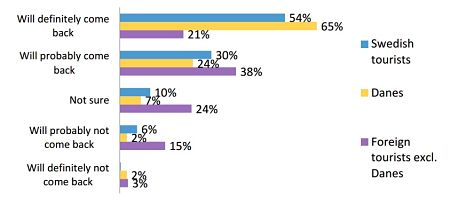
The statistics of the likelihood of visitors to Malmö for Eurovision 2013 returning to the city in the future (Source: Malmö Town)
In Copenhagen the story was a little different. The official tourist board analysis showed a similar amount of tourist spend at €16.5 million and over 80% of attendees planning to return to the city. However, the high cost of transforming a shipyard into a shipyard with a TV studio inside was partially borne by a subsidiary of the Copenhagen tourist board which completely blew its initial budget of €4.6 million and ended up spending €18.3 million. To be fair on Wonderful Copenhagen, the rest of the tourist activities such as the opening ceremony, Fan Mile, Euro Club and the after party were all brought in on budget and at a lower cost than in Malmö. Local media however reported that the tourist board’s analysis was flawed, and that Eurovision tourists displaced Copenhagen’s normal tourist trade, meaning the benefit was not as high as initially claimed.
As a result of these issues Wonderful Copenhagen had to make three people redundant and will have a reduced budget for 7 years, while they pay back some of the overspend. Clearly Eurovision can be a burden as well as a blessing for tourist boards, but as long as they don’t plan to construct a whole new arena, it seems like on balance hosting Eurovision is a positive experience.
Vienna’s Steps Beyond The Song Contest
So has the Vienna tourist board been put off by Copenhagen’s misfortune, or buoyed by Malmö’s success? Anyone who is currently in Vienna couldn’t help knowing that Eurovision is in town, as the tourist board has pulled out all the stops. Publicity started in March with a blow-up ViennaSphere heading out on a European tour to promote Vienna and Eurovision. On the ground in Vienna they have branded the whole city with a Vienna #12Points campaign.
Pretty much every billboard and park is covered with Eurovision adverts. Even the public transport is being taken over by Eurovision with Conchita recording announcements for the trams and underground. From Eurovision-inspired art exhibitions to the unveiling of a Conchita waxwork at Madame Tussauds, even the museums are getting in on the act. The tourist board has four dedicated staff working to promote the double act of Eurovision and Vienna.
The press can enjoy a Vienna Pass worth over €100, generously giving us entry to over 60 museums for the whole Eurovision period. We get a free swim in the Stadthalle’s pool and sauna, a wide choice of free tours, river cruises and concerts, and even the chance to throw ourselves off the TV tower all organised and paid for by the tourist board. The packed press bag is overflowing with freebees, maps, books and guides for the city – all tailored towards Eurovision (see Terry’s unpacking of the bag for the full reveal). We have never felt so cared for before.
Fans don’t have to miss out either with special walking tours and even Eurovision themed art history tours available from the tourist board. Several art galleries and museums have Eurovision-themed exhibitions including Nul-Pointers, which ‘presents the faces of these ultimate losers burned onto old wooden panels’, 40 chairs designed with the theme of the participating countries on show in the Museum Quarter, and a special exhibition of the Austrian entries throughout the years at the House of Music.
This intensive promotion seems to be working, as the ‘gay traffic lights’ story has gone global this week, hitting all the continents of the world in a way Armenia’s song can only dream of. Vienna has achieved this kind of recognition by getting parts of the city interested in the Song Contest that would never normally be involved. We really have a whole city that is captivated by the events of the Contest.
Changing The Image Of Classical Austria
So what does Vienna hope to achieve from this intensive tourist campaign for the city? EurosongBe spoke to Vienna tourist board Managing Director Norbert Kettner back in February about the importance of Eurovision to tourism in Vienna. He explained that Vienna is “one of the leading destinations in the world, but still [Eurovision] has such a huge impact on the image of an open, modern and tolerant city”. ESCToday has also spoken to Norbert Kettner about the tourist board’s involvement in the contest. Their interview makes clear that from the moment that Conchita won, the tourist board was active in preparing a bid to host. They hope that “Vienna’s image as a city of music will be boosted and the city will gain experience in hosting such large events as the Eurovision Song Contest. It will also serve as a role model for event managing and hosting”. As we have seen in Malmö this is a reasonable expectation as hosting Eurovision showcases their capability to host large events.
There is also a hope that hosting the event will update the image of the city, which is currently skewed towards classical music and royal palaces. Norbert Ketter stressed in the ESCToday interview “The city is young and is the 2nd fastest growing city in Europe. There are lots of young people in Vienna due to the fact that the city has many universities on offer. It is among the biggest university cities in Europe.” On our free press tour of a local market, the tour co-ordinator confirmed that the tourist board was looking to update the perception of the city and country to show its more progressive and modern side. We can see this evidenced with bungee jumping, modern architecture tours and forest rope walks all available for the press alongside the more traditional palace and classical music offerings.
The tourist board is also taking advantage of the opportunity to promote Vienna as a tolerant and LGBT friendly city. They have a strong offering for gay and lesbian tourists, with a dedicated section to their website, and Norbert Kettler has announced that the tourist board have an official gay strategy. From free gay and lesbian tours of the city for the press and fans, to the highly publicised tolerance traffic lights, the message is coming through clearly that Vienna is a strong supporter of gay rights. The timing of the Life Ball in the week before Eurovision can only help to drive this message home.
Vienna’s Modern Future
An increased presence on the international tourism scene is clearly a benefit of hosting the Eurovision. Vienna’s has embraced this opportunity with both hands, and is re-branding the city with a younger, more tolerant theme. Looking at the past few contests, cities which don’t spend too much money on infrastructure will see a profit from hosting the event, plus the additional bonus of repeat tourism, increased interest in holding conferences, and indirect advertising value. By treating the press well, the Vienna tourist board must be hoping for the chance of positive exposure for a city, showcasing the diverse city experience.
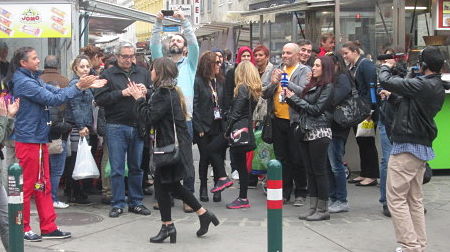
Portugal’s Leonor Andrade on an official tour of the Brunnenmarkt, one of Vienna’s most diverse markets, with the rest of the Portuguese delegation (Photo: Ben Robertson)
Vienna has gone above and beyond the expectations that the press and fans have for host cities. There is far more for Vienna to gain than Malmö or a Copenhagen, in terms of re-branding the city image, and we could argue the branding scope is different than that of Baku. Azerbaijan’s hosting of Eurovision proved it could host such large-scale events, something which Vienna has no issue with.
Vienna instead has the unique task of using Eurovision for a change in its image. One can see the Vienna of old, with historic horse shows and classical music, but the Eurovision splash of coverage can allow all coming into the city to share a completely different Vienna, a younger and more liberal one. The Tourist Board is targeting the Eurovision Song Contest as the medium to demonstrate that their tourist package includes more than just Mozart and Strauss. Much like Conchita Wurst herself, Vienna is ready to transform into a brand new being that represents a wider diversity, and one the city plans to profit from over the coming years.









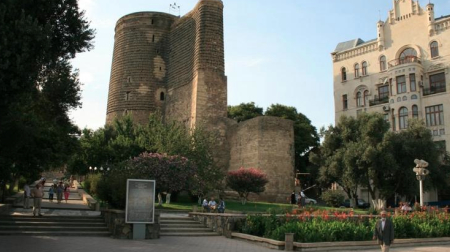
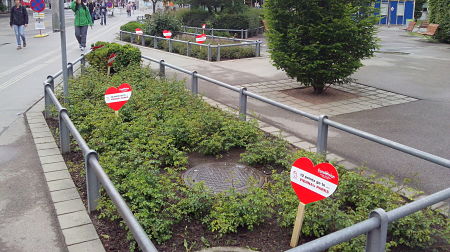
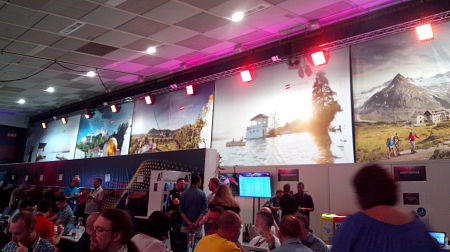
I’m only watching this from afar, talking to friends in Vienna, and writing about ESC for my site, but from what I’ve seen Vienna has done a spectacular job with Eurovision.
Sure, we have another week to go yet, but so far they seem to have pulled out all the stops.
Can’t wait for semi final 1 🙂